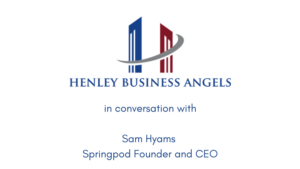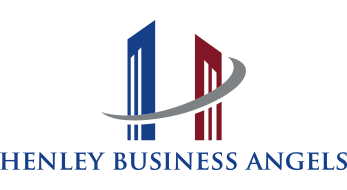08 Oct In Conversation With: Sam Hyams, Springpod Founder and CEO

Henley Business Angels has a core focus of mentoring and coaching the upcoming entrepreneurial generations, and companies that also share a vision of betterment and improvement are of great interest. Back in 2019, one of our members contributed to Springpod’s £600k funding round, so we sat down with Founder and CEO, Sam Hyams, two years later to find out more about the company, their progress since Henley Business Angels’ investment, and Springpod’s plans for the future.
What is Springpod?
Springpod is a careers enablement platform that connects young people with top employers and top universities from the age of 13 onwards. We work with primarily secondary age students to provide life-changing virtual career experiences and opportunities for every young person.
How did Springpod come to be?
We formed the company around 5 years ago because I always felt that careers advice for young people was a running joke in society; it was awful and everyone just seemed to accept it. I started from the perspective of wanting to dramatically improve that and move it away from being almost entirely dependent on which school you attend, who your parents are, or what alumni networks you have access to; the existing system was so unfair on a lot of young people.
When I studied engineering at University and came across the STEM skill shortage and the massive gender imbalance, I saw these as two sides of the same coin. The root of the problem was that young people don’t get to experience these sorts of careers and industries early enough in their academic career, meaning they don’t get the opportunity to make those decisions. That’s the essence of how Springpod came to be.
When did you apply to Henley Business Angels? What was the outcome?
I think we first applied in 2019. I pitched, a couple of times, to a large group of angels which gave me great feedback. We managed to bring one angel on board for our growth round, which was the investment round before the one we just closed. It was a great experience and your members have a great knowledge of the industry too.
How did you find the application process?
The application process was similar to all other processes, but the pitch was different in that it was a very receptive audience. The calibre of angels in the group is incredibly high, and it was great to pitch alongside the other companies, learning a bit more about them as well.
What did you do with the money you raised from Henley Business Angels?
That was during our £600k growth round, which we used primarily to scale the team from probably about 8 or 10 members of staff to around 15, focusing mainly on our sales team. We’d already got proof of concept for scaling, so we believed that doubling our sales team and growing the revenue was the best route. This then allowed us to move into our Series A which we closed a couple of months ago.
Yes, we saw that; was it £2.25m?
We’ve just topped it up so it’s actually £2.5 million
Congratulations; what are your plans for that funding?
Thanks! We’re going to be scaling the UK team going from a headcount of about 70 now and are expecting to be at 100 within the next 6 months. We’re also exploring international expansion and expect to be in two new territories within the next 12 months. The investment will enable us to set up new domestic hubs; so helping students connect with employers and universities in their own country, but also facilitate those inter-hub links to help UK universities attract and enrol students from overseas as well.
Did you have an exit strategy when you pitched to HBA? Do you still have one? Has it changed?
We do. We’re working towards a 4- to 5-year timeline, so we expect to end up with a trade acquisition or an IPO at some stage.
Springpod has some great partnerships, from the NHS to Nestle. How did you start to build these relationships with these companies? Are there any exciting ones coming up that you’re hoping will be introduced soon?
We started with STEM, so science, tech and engineering employers, and that was purely because the pilot group of schools that we worked with were all STEM-focused, getting us a few referrals, which was great. Airbus, SSE and a few others were the first companies we started with, but our ambition has always been that every young person, regardless of what they are interested in, has access to high-quality opportunities. Now, we’re completely sector-agnostic. We’ve got STEM, obviously, with companies like Jaguar Land Rover and Network Rail, and we’ve also got finance companies and professional services firms on there such as EY and Deloitte. Healthcare is a big one, as you mentioned, we’ve got lots of NHS Trusts, which is quite timely, and we also work with legal firms across the whole range of specialities. We’re starting to see a lot of word of mouth as a way the brand gets out there, which is brilliant, especially for all the young people. We’re at about 250,000 students on the platform at the moment, with 5,000 joining every week. It’s all about giving them as many opportunities as possible across the entire industry spectrum – that’s our focus.
And what’s the typical type of work experience students undertake?
Normally the students do about 2 weeks. Typically it’s around 10-15 hours of work over those two weeks and we structure it to be as close to in-person work experience as possible. There’s lots of live interaction, webinars, Q&As, quizzes, assessments, and a final exercise. After completing all this, the student gets a certificate so they can begin to build up their CV and employment profile from a young age.
How do the students benefit from this, do you have any particularly great success stories?
We do. We track across four main impact metrics:
- Have we increased the awareness of a particular career/industry/company/university?
- Have we increased the aspirations for a student to embark on that particular pathway?
- Have we increased the student’s aptitude through these programmes; have they learnt something?
- Have we increased the likelihood of the student ending up in a fairly similar industry or with that employer?
The nicest thing we get are the student testimonials. We get so many messages from students, a lot of whom have ended up at the employer after doing the work experience with them which is brilliant. Obviously, seeing the outcomes come to fruition like that does take time, around a couple of years if they’re doing the work experience in year 11 or 12.
We also get messages from parents to talk about their child’s experience. One that always sticks in my mind is a parent that couldn’t afford the university fees for their child, and they came across the apprenticeships offered through Springpod. Their child ended up doing a degree apprenticeship with Fujitsu at the end of it. Those sorts of testimonials are brilliant and show we’re making a real impact.
That sounds great. What is your business model?
We make all of our revenue from the employers and universities we work with, keeping it completely free for students.
For our employers, we provide solutions in three key areas. The first is our virtual experiences, from virtual work experiences for employers or degree tasters for universities, offering a two-week introductory programme for students that might be interested in studying engineering in Bristol, for example. We help them through that two-week period and help them decide whether committing to a 4-year course and the accompanying debt is what they want to do, or whether they want to work towards something else.
Our second pillar is our virtual events. We run a lot of online open days for universities and colleges, and we also run a lot of virtual careers fairs for employers, ‘Meet the Apprentice’ events, that sort of thing.
Finally, our third pillar is audience solutions. We help our clients target their messages at specific groups of students that they find difficult to reach. Our mission is heavily tied into driving social mobility and improving diversity and inclusion. Under this pillar, we take brands who have potentially quite an undiverse intake historically, getting their message in front of a really diverse audience from a young age and changing perceptions by showing them relatable role models and driving that through to the application stage in a couple of years time.
Our commercial model is built around those three pillars, with all of it focused on building a long-term talent pipeline for those clients, primarily focused on that engagement stage and awareness amongst our younger students, with getting hired by a top employer or admitted to a course at university as the end goal.
Are law students, for example, popular users on your platform?
Funnily enough, Law is our most popular category at the moment.
The diversity stats are incredible for law. We have about 45% BAME on the platform, and about 20% of our students are free school meal recipients, which is about double the national average. We’ve helped over 100,000 students go through those programmes in the last few months, so the scale has been exciting, and law experiences have been some of the most popular. I think for students, the most popular ones tend to be subjects you can’t study at school, such as law, engineering, etc. It’s those subjects that you won’t really know what they are until you get to university.
And what do students do? You obviously make the platform available to all students who are able to create a profile and enrol on your virtual programmes?
Yes, our student journey starts with an exploration of different pathways. There’s lots of apprenticeship information, as well as further education college courses next to degree information and university content, plus lots of labour market information.
The problem normally is that when the student finds something they’re interested in through research on the internet, what do they do next? That’s where we come in to provide the experience stage. We recommend the students attend relevant virtual events with us, virtual work experience, we also have a collection of podcasts too. All of those should be done over a number of years, and then when the student reaches the application stage they have all these touchpoints with that particular employer who can see that they’re heavily invested and a highly-engaged applicant, making them much more attractive and much less likely to drop out in their first couple of years.
So now you’ve got your Series A investment, can I ask what you’re expecting this year?
This will be a really exciting year for Springpod. We are now the UK’s leading virtual work experience provider but we know there is a way to go. That is why we have committed to providing 1 million young people with access to life-changing career and university experiences within the next two years. We have got some new innovations planned to help students experience university courses while still at school and are also pushing ahead with international expansion. Thank you to HBA and your members for your support. It was a year and a half ago now but it made a massive difference at the time and helped us grow to the position of being able to support thousands of young people with finding their future path.
Find out more about Springpod by heading over to their website, and follow them on Facebook, Instagram, LinkedIn and Twitter to stay up to date with their opportunities.


